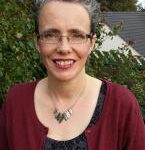We are standing in a liminal space, an in-between space, how things were and how things may be in the future. Over the past year we have been unmoored, disconnected from our usual routines and while there has been an experience of loss there has also for many been an experience of gift, of being invited forward on an unknown road, a sense of the Spirit at work. As I have said before, I do not believe that God has “sent” Covid as a challenge or reprimand. I do believe however that there are questions we face within every life experience – “Where do I find God in this and how do I respond as a person of faith?”
Those are questions that I have lived with over this past year and I know that I am not alone when I say that I think we are being called into a time of transformation. I have been invited to take part in the launch of a book, Maynooth College reflects on Covid-19 in mid-May. I have found the essays in the book very thought provoking and many of them have resonated deeply with me. Indeed I would suggest that any individual or parish group would do well to read the book and take time to reflect on the questions at the end of each chapter. Within those pages we encounter the call to walk with those who grieve, the call to prayer when we cannot attend Mass, an understanding of home as a place of faith and devotion, the question of community and what it means to be a eucharistic community rather than simply a group of people who receive the Eucharistic host.
There are questions we have to ask, conversations we have to have if we are to move forward in a way which will be life-giving. This has been echoed in the strong and challenging words of Bishop Michael Duignan in his ‘Pastoral Reflection on the Future of the Church in the Diocese of Clonfert’. Having known him for many years and worked with him on a variety of projects, it gladdens my heart that my friend has not been made timid by his ordination as Bishop.
What Bishop Michael is suggesting is that we need to find a new way of being Church and that to do so we may have to let go of some habits of the past and discover new ways, new habits which allow the Gospel to shine forth. They are brave words, inspired by the writings of Pope Francis and underpinned by a confidence that it is the Holy Spirit who is leading – if we would but follow.
As I write, images from a recent Sunday Gospel echo within me – images of a vine and branches, of pruning and growth. How have we been pruned over the past year? What new growth awaits us? I remember how the pastoral reflections offered in the run-up to the Eucharistic Congress in Ireland in 2012 caused outrage in many parishes around the country. The first theme of the reflections was Gathering as Community and there were those who insisted that gathering was irrelevant, that the focus should be solely on the Eucharist. I am inclined to think that such attitudes, such dismissal of community, have now come back to bite us.
Belonging, that business of being part of the vine, is something that has to be nurtured. I watched the film Nomadland recently and found there a most beautiful expression of the power and strength of community. Our sense of self, our sense of purpose are shaped by our belonging. Bishop Michael calls for the building of authentic Christian communities – even if they are small in number – which are nurtured and strengthened by Scripture, prayer and the sacraments in order to go out and work for justice and care for those who are on the margins of society. This is what a eucharistic community would look like and when we are part of such a community we know that we belong, that our identity is shaped by Christ, that life and faith are utterly intertwined. Isn’t that a transformation you’d want to be part of?


 Bairbre Cahill
Bairbre Cahill
